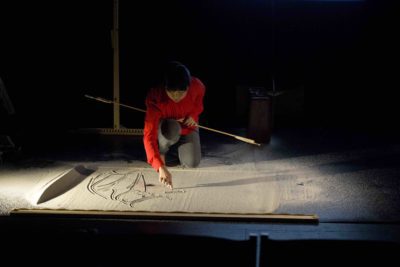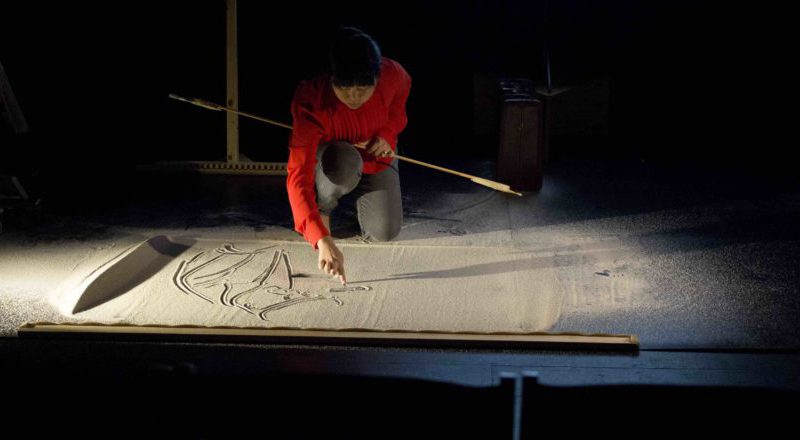INTERVIEW: Performance trilogy includes true story of Japanese American internment camp

the ephemera trilogy, which opens Feb. 21 at The Paradise Factory on New York’s Lower East Side, tells the true story of two men in a Japanese American internment camp during World War II. The theatrical presentation comes courtesy of creator and performer Kimi Maeda, who uses her father’s story as one of the subjects in the evening-length piece.
ephemera, which is being presented in New York City by The Tank, is split into three parts, including Bend, The Crane Wife and The Homecoming. The story of Maeda’s father, Robert Maeda, is told in Bend through shadow puppetry and sand art, making for a unique evening at the theater.
“After I finished creating Bend, which is about my father and the artist Isamu Noguchi, I thought it would be really great if I could do it at the Noguchi Museum, so I had been trying to contact them for a while,” Maeda said recently in a phone interview. “It just hadn’t worked out for a number of years, but this year they got in touch with me. And strangely right at the same time … The Tank contacted me, so it was a really great confluence of events. I’m going to be able to bring the whole trilogy to The Tank but also bring Bend to the Noguchi Museum, which I think is just a really special experience for me.”
The creation of the trilogy has taken many years and many workshops. Maeda was trained as a scenic designer, so the materials she works with are often her focus in the initial planning stages. “I do start with scripts and audio, but visual things and materials are really important to me,” she said. “I am always really insistent on trying to find a connection between the story that I’m trying to tell and the material that I’m using. I think that’s really important, and so in this case, sand for Bend was really appropriate I thought.”
Maeda had used sand as a medium before when she was commissioned to create Grim and Glory, a multimedia puppet piece celebrating barbecue pitmasters. For that experience, she liked the flexibility of the sand, and for Bend, she found it an appropriate tool to explore memory.
“With the story about my father, since it is about memory and it also takes place in the desert and looks at Noguchi as a sculptor, it just seemed really appropriate to use sand for that show,” she said. “In the barbecue piece, I was using it up on a light table, which … if you’ve seen YouTube videos of sand artists, you’ve probably seen them do that where they’re using sand on a light table with probably a video camera on top, and for Bend, I’ve changed it a bit. I’m still using cameras, so the audience can see what I’m doing on the floor. But, yeah, I’ve put it down on the floor, and so I feel like there’s just more physicality with my entire body. And it also, I think, refers more to a landscape as opposed to something that’s just confined to a table.”
the ephemera trilogy has grown over the years. The subjects in the piece are ones that Maeda has been artistically focused on since her days in graduate school. She created The Crane Wife first; the piece is focused on her mother’s experience and incorporates a Japanese folktale. The Homecoming came next when Maeda was asked to organize a “puppet slam” event in her hometown of Columbia, South Carolina.
“They’re not competitive like poetry slams,” she said. “They actually are happening all over the country, and Heather Henson, one of Jim Henson’s daughters … she heads the puppet slam network. So they were giving grants to puppet slams across the country. … We bring puppeteers from all over the Southeast, in our case, and everybody does a really short piece. Usually it’s kind of experimental, and it’s always for an adult audience. So it’s a chance for puppeteers to experiment, try new things, and they’ve been great for me because in the case of Homecoming, I created the piece for that but then sort of realized it actually connected back to Crane Wife.”
The Homecoming is a shorter piece that is told through shadow puppetry using a flashlight and paper cutouts. Bend came last, and that’s the part focused on her father and Noguchi. Once the three were complete, Maeda realized they were all about her family, and she started to think of them as a trilogy.
“They’re all about ideas of identity and home and bi-culturality, and so it seemed like they should all come together into a full piece,” she said. “So I did it in a May as a trilogy here in Columbia, and it was really interesting coming back to Crane Wife, especially because I’ve changed a lot. And the piece is a really personal piece, so I changed The Crane Wife a great deal for that show.”
For The Tank engagement, Maeda has reworked The Crane Wife again, so much so that today’s presentation is a completely different piece than its original incarnation.
“The first part is kind of the same, but I’ve completely changed the format,” she said. “I used to do … most of the piece entirely in a cabinet, and I used an overhead projector and was doing shadows that way. But I have gotten rid of the cabinet entirely, and I’m using my body a lot more to create shadows. Also instead of a using an overhead projector, I’ve tried to simplify that a bit, too, and I’m just using some lights and a mirror. So, in some ways, it’s simpler. In some ways, maybe it seems a little trickier, but, yeah, I actually feel a lot more comfortable with where the piece is now than where it had been in May. Like I said, I think it’s a piece that it’s just continually growing with me, and if I have to do it again in the future, I’ll probably have to rework it a bit more. I’ve just incorporated different thoughts that I’ve had. I’ve learned different things about the folktale that I hadn’t realized when I first started working on the show, so I’ve incorporated that. I’ve incorporated just different things that have happened in my life.”
Maeda comes from a family of artists. Her mother’s father was a professional painter, and her father was an art historian. It seems only fitting that Maeda would become a puppeteer and performance artist herself.
“I really grew up in museums, so art has always been a part of my life,” she said. “When I was really young, I thought I wanted to be an artist, and then I got older and thought I wanted to be a biologist. But in college, I kind of realized that I enjoyed the process of creating art more than I enjoyed biology, so I came back to the art world. Yeah, I have never really wanted to be a performer. That was never my goal in life.”
Maeda went to grad school at Central Saint Martins University of the Arts in London and studied scenography. She was exposed to the work of choreographers, designers, architects and sculptors. She was tasked with creating different projects that didn’t have any creative restrictions.
“My tutor at the time sort of pointed out that my presence in the pieces was actually really important to the pieces because my pieces are often about my own identity, and having an actor playing my part would actually really be inappropriate,” Maeda said. “I don’t consider myself an actor. I think I consider myself more just an artist. I’m not acting on stage. I’m really just being myself, which I think is a little bit different.”
the ephemera trilogy is ostensibly about Maeda’s family and, in particular, about her father’s struggle in a Japanese American internment camp. However, the audience members, much like Maeda herself, will almost certainly pick up on present-day parallels. That’s one of her expectations when she performs the piece at The Paradise Factory as part of The Tank’s season.
“I think it’s a really timely piece now unfortunately,” she said. “With everything that’s going on with immigration right now, I hope that the audience does see some connections. … We’re losing the survivors who went through the internment. I think it’s really important for America to remember what happened and be aware that something similar could happen, and we need to make sure that it doesn’t happen because it was a shameful moment in our history. And, yeah, I think that’s the main takeaway from that performance.”
By John Soltes / Publisher / John@HollywoodSoapbox.com
the ephemera trilogy, created and performed by Kimi Maeda, will play The Paradise Factory as part of The Tank’s upcoming season. Performances run Feb. 21 to March 12. Click here for more information and tickets.


Thank you. What are or were the dates and locations of the recent and future performances?